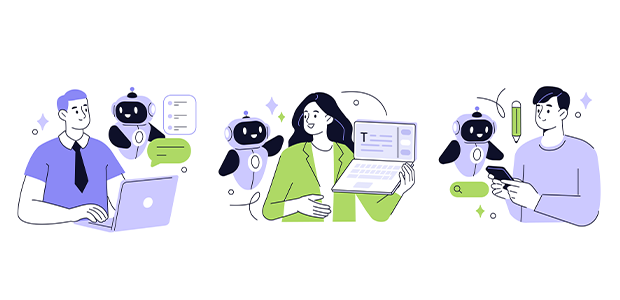
Younger generations are embracing AI-generated communications
As AI becomes increasingly widespread and affordable, businesses face increasing pressure to harness its potential in communications. Research from Quadient reveals a clear generational divide in UK consumer attitudes. While 49% of consumers aged 18-35 are now comfortable with organisations using AI-generated communication, this drops to just 23% among those aged 55 and over.
This divide highlights how younger consumers are already recognising AI’s value. Nearly half (47%) of 18-34 year olds believe AI enables faster responses to customers, compared to just 30% of those aged 55 and over. Further supporting AI’s positive impact, a recent KPMG customer experience report showed a 1.4% rise in customer satisfaction scores among the UK’s leading brands in 2024, the most significant rise in three years, owing to the strategic adoption of AI.
With AI acceptance expected to grow, businesses stand to gain significant advantages in efficiency, productivity and customer engagement. However, Quadient’s research shows that companies must proactively reassure customers that their use of AI will improve communications and their overall experience, rather than hinder it.
“AI isn’t just about passing the Turing test or mimicking human conversation,” said Antony Paul, Head of Global Product at Quadient. “From automation to data consolidation, AI is far more than just ChatGPT – at its best, it helps businesses make smarter decisions that deliver genuine benefits to customers. The smoke and mirrors around AI has left many consumers uncertain about how it’s actually being used. To build trust, businesses must clearly demonstrate how AI improves customer experience, whether that’s through streamlining processes or personalising messages. Key to this is transparency, organisations simply can’t keep customers in the dark about their use of AI in communications.”
Despite its advantages, consumer caution around AI in communication underscores the need for its thoughtful implementation to demonstrate AI’s accuracy, authenticity and transparency. Quadient’s research shows the majority of all age groups – 61% of 18-54 year olds and 53% of those 55 and over – still believe AI creates lower-quality communication than humans.
Trust remains a key challenge, with 53% of consumers believing that if an organisation uses AI to generate communications then it does not care about its customers. Additionally, 81% of consumers of all ages believe organisations should disclose when AI has been used to generate communications.
To meet consumer expectation, businesses must implement AI thoughtfully and effectively, ensuring it helps, rather than hinders, the customer experience. For AI to truly benefit consumers, businesses must prioritise transparency and quality to build customer trust and improve the effectiveness of communications.
Trust issues are even more pronounced when AI is used in high stakes or sensitive situations, where consumers are more likely to react negatively to AI-generated communications. Quadient’s research finds 45% of consumers would feel anger, disgust or discomfort if they discovered that medical test results were AI-generated, along with 34% for insurance claim responses, and 29% for medical appointment letters. Beyond concerns about communication quality, these reactions also reflect consumer apprehension around data security, an essential pillar of trust in AI. While AI can be used transparently and securely, it’s up to businesses to clearly demonstrate this to consumers, reassuring them that their data is handled safely and ethically.
“When dealing with sensitive or personal situations, the last thing consumers should worry about is whether AI is handling their information securely. This presents a real opportunity for businesses to increase consumer trust in AI-generated communications. If businesses can show where customer data is being stored and how AI interacts with it to deliver the right message through the right channel at the right time, they’ll not only gain consumer confidence. They will also unlock the full potential of their technology investments," Antony concludes.
For more startup news, check out the other articles on the website, and subscribe to the magazine for free. Listen to The Cereal Entrepreneur podcast for more interviews with entrepreneurs and big-hitters in the startup ecosystem.

